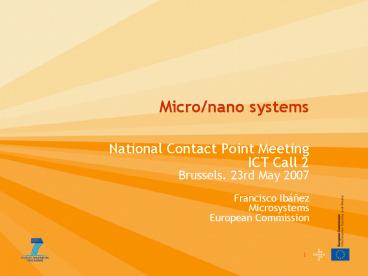Micro/nano systems PowerPoint PPT Presentation
1 / 22
Title: Micro/nano systems
1
Micro/nano systems
- National Contact Point Meeting ICT Call 2
- Brussels. 23rd May 2007
- Francisco IbáñezMicrosystemsEuropean Commission
2
Challenge 3Components, Systems, Engineering
- Objectives
- ICT-2007.3.1 Next generation nanoelectronics
components and electronics integration - ICT-2007.3.2 Organic and large area electronics
and displays - ICT-2007.3.3 Embedded systems design
- ICT-2007.3.4 Computing systems
- ICT-2007.3.5 Photonic components and subsystems
- ICT-2007.3.6 Micro/Nanosystems
- ICT-2007.3.7 Networked embedded and control
systems
Call 1
Call 2
3
Micro/Nanosystems
- Micro/nanosystems are miniaturised systems able
to - sense, diagnose, describe and qualify a given
situation - suggest or implement appropriate actions
- interact with the user, the environment or
another smart systems.
4
Micro/NanosystemsFeatures
- Interdisciplinarity Mechanics, electronics,
fluidics, biology, magnetism, optics - Convergence Micro/nano, ICT, bio
- Heterogeneity Semiconductor, ceramic, glass,
organic - Multifunctionality
- Sensing, processing, logic, memory, comm,
energy - Integration Monolithic, hybrid, multichip,
large area
5
ICT-2007.3.6 Micro/Nanosystems
- Next generation smart systemsSensor-
actuator-based systemsHigh density mass storage - Micro/Nano-Bio-ICT convergenceBiosensors,
lab-on-a-chip, bioMEMS,autonomous implants - Integration of smart materialsIntegration of
micro-nano technologies and smart systems into
new traditional materials, e.g. textiles,
glass, paper - From smart systems to viable productsMicrosystems
manufacturing technologies - Smart systems for communications data
managementSmart micro/nanosystems enabling
wireless access facilitating intelligent
networking - Support actionsTechnology access, education
training, coordination - dissemination at EU level
Courtesy STELLA
()
Courtesy INTELLIDRUG
6
Micro/nano systemsIndicative Budget
- Total 83 M
- 75 M Collaborative Projects
- 20 M IPs (min.)
- 32 M STREPs (min.)
- 4 M NoE
- 4 M CSA (CASA)
- Total amounts to be confirmed after a new
financing - decision for the 2008 budget
7
Objective 3.6 (a) Next Generation Smart Systems
- Outcome
- Major breakthroughs in intelligent sensors and
actuators - Integrated micro/nanoscale smart systems
(closed-loop) - Energy scavenging, storing and management
techniques - Design and packaging technologies
- Integrated systems for very high density mass
storage
Courtesy of project INOS
Complexity, performance, miniaturisation,
autonomy, cost
8
Objective 3.6 (b) Nano-Bio-ICTechnologies
convergence
- Outcome
- Converging micro/nano, bio and information
technologies - Application areas including environmental
monitoring, agriculture and food quality, safety,
security, biomedical and lifestyle - Address packaging, interfacing, as well as
ethical and societal issues.
Courtesy of project OPTOLABCARD
biosensors, lab-on-chip, biorobots,,
nanoimplants, bioMEMS, microsystems for food,
safety, environment
9
Objective 3.6 (c) Integration of Smart Materials
- Outcome
- Integration of micro-nanosystems into new and
traditional materials, e.g. textiles, glass,
paper, etc. - Emphasis on SFIT (Smart Fabric Interactive
Textiles) using micro/nanosystems,
microelectronics, user interfaces, power sources,
for personal wearable applications.
Courtesy of project SHIFT
Biocompatible, bioconnective, flexible, durable
materials
10
Objective 3.6 (d) From smart systems to viable
products
- Outcome
- Advanced, cost-effective technologies for
sensor/actuator manufacturing and system
integration - Alternative fabrication and testing processes for
low/medium scale volume and short time-to-market - Pre-industrial validation of manufacturing
concepts suitable for large-scale production
Courtesy of project AMICON
Materials, equipment, design, manufacturing,
modelling, testing, reliability
11
Objective 3.6 (e) Smart Systems for
communications and data management
- Outcome
- Micro/nanosystems enabling wireless access and
networking - Data management, storage and processing functions
of smart systems
RFID, HF-M/NEMS, data management
12
Objective 3.6 (f) Support actions
- Outcome
- Ensure access to micro/nanosystems
manufacturing technologies, in particular by SMEs - Identify training and education needs propose
actions - Coordination and dissemination of smart systems
integration RD at European level
Courtesy of project NANOSPAD
13
Objective 3.3.6 Micro/Nanosystems
- Expected Impact
- Achieve substantial improvement on various
aspects of smart systems integration Higher
product quality and reliability, increased
miniaturisation, integration and functionality,
lower costs, reduced power consumption, higher
speed requirements and/or shorter time-to-market.
- Provide innovative micro/nanosystems concepts and
deeply transform industrial production by adding
intelligence to process control and the
manufacturing shop floor, and by improving
logistics and distribution - thereby increasing
productivity. - Contribute to increased market share for European
companies across different industrial sectors by
delivering systems with new functional
capabilities and improved quality within a
competitive timeframe.
14
- FP7 - ICT PRIORITY
- INFORMATION DAY on CALL FOR PROPOSALS 2
- OBJECTIVE 3.6 MICRO/NANO SYSTEMS
- Tuesday, 29 May 2007
- Venue Charlemagne Building, Lord Jenkins (S2),
Brussels - A number of officials from the European
Commission will present the - themes and key information on FP7 proposal
submission. The information day will provide
possibility for, ideas/proposals announcement,
interaction on the spot and partnerships.
Afternoon session with 5 presentation of
proposal ideas and expressions of interest - http//cordis.europa.eu/fp7/ict/programme/events3-
20070529_en.html - http//cordis.europa.eu/fp7/ict/programme/challeng
e3_en.html
15
Micro/NanosystemsFP6 (2002-06)
16
Micro/NanosystemsFP6 (2002-06)
17
Microsystems FP6 EC Contribution per type of
organisation
RES Research organisations HE Higher education
or Training IND Industrial organisations private
or public OTH Organisations not fitting in one
of the above categories
18
Projects and EC contribution per type of projects
19
Some more statistics
CA IP NoE SSA STRP Total
Total number of Projects 5 21 4 6 43 79
Total Project costs (M) 3.4 312.3 22.8 2.9 165.8 507.2
Total Project EC contribution (M) 3.4 173.3 20.8 2.9 100.6 301
Average Project costs (M) 0.68 14.87 5.7 0.48 3.85 6.42
Average EC contribution (M) 0.68 8.25 5.2 0.48 2.34 3.81
Average Duration (months) 24 42.6 45 31 35.5 36.8
Total number of participants 37 339 82 37 333 828
Average number of participants 7.4 16.1 20.5 6.2 7.7 10.5
20
Experts call
- https//cordis.europa.eu/emmfp7/
- Call for experts for FP7
- FP6 experts have been invited to transfer to FP7
and to update their CV( using the email address
in FP6 database!) - Nacional contact points can suggest names for
experts in micro/nanosystems
21
For more information
- European research on the web
- http//cordis.europa.eu
- http//cordis.europa.eu/fp7
- http//ec.europa.eu/comm/research/future/
- Information Society and Media
- http//ec.europa.eu/information_society/
- http//cordis.europa.eu/ist
- Directorate G
- http//cordis.europa.eu/ist/directorate_g
22
Micro/Nanosystems
Thank you!
Website http//cordis.europa.eu/ist/mnd/
Contacts Francisco.Ibanez_at_ec.europa.eu Andrea
s.Lymberis_at_ec.europa.eu

